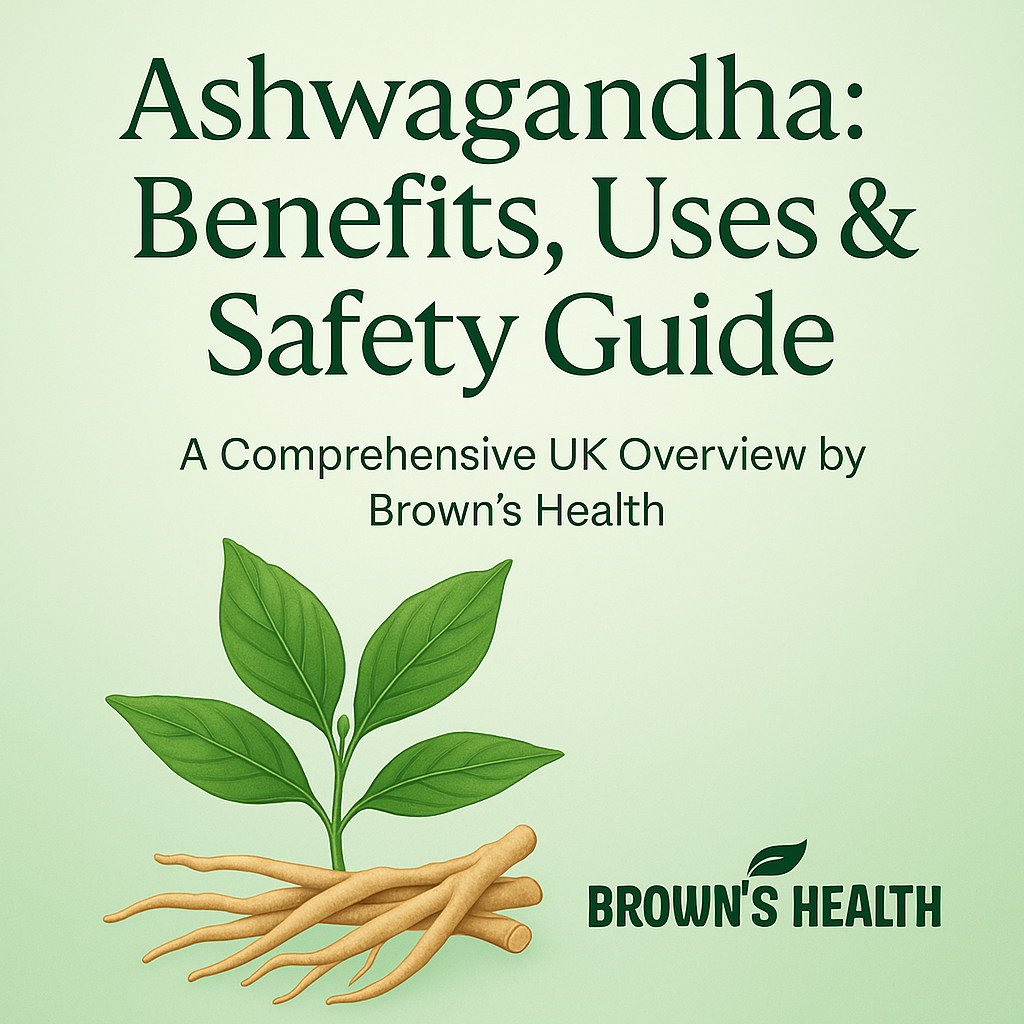- 1. Introduction: What Is Ashwagandha?
- 2. What Does Ashwagandha Do?
- 3. Potential Benefits of Ashwagandha
- 4. Forms of Ashwagandha Supplements
- 5. How to Take Ashwagandha
- 6. How Long Does Ashwagandha Take to Work?
- 7. Is Ashwagandha Safe? Possible Side Effects
- 8. Ashwagandha and Other Supplements
- 9. Frequently Asked Questions (FAQs)
- 10. Conclusion & Disclaimer
1. Introduction: What Is Ashwagandha?
Ashwagandha (Withania somnifera) is a traditional herb used for centuries in Ayurvedic practices. Sometimes referred to as “Indian ginseng” or “winter cherry,” ashwagandha is classified as an adaptogen, meaning it may help the body adapt to stress.
In the UK, ashwagandha is available in various forms, including capsules, tablets, gummies, and powders. One of the most studied extracts is KSM-66 Ashwagandha, known for its high concentration of active compounds called withanolides.
People often turn to ashwagandha supplements to support their overall wellbeing, manage stress, and maintain balance in daily life.
2. What Does Ashwagandha Do?
Ashwagandha is traditionally used to help promote balance and vitality. As an adaptogen, it may support your body’s natural response to physical and emotional stress.
Modern research has explored ashwagandha for its potential effects on:
- Energy and endurance
- Sleep quality
- Mood and anxiety management
- Hormonal balance
While more studies are needed, many people incorporate ashwagandha into their routines to help them feel more centred and resilient.
3. Potential Benefits of Ashwagandha
3.1 General Benefits
Ashwagandha is believed to offer a range of potential benefits, including:
- Supporting the body’s ability to cope with stress
- Promoting relaxation and restful sleep
- Helping maintain energy and focus
- Supporting healthy weight management when combined with diet and exercise
- Providing antioxidant activity, which contributes to overall health
- Supporting skin health and vitality
Note: These benefits are based on traditional use and emerging research but should not replace medical advice.
3.2 Benefits for Men
Men often use ashwagandha for goals related to performance and hormonal health. Emerging evidence suggests it may:
- Support healthy testosterone levels within the normal range
- Help improve fertility parameters such as sperm quality
- Aid in muscle recovery and strength when used alongside exercise
- Support libido and overall vitality
If you are considering ashwagandha for testosterone or fertility, it’s important to consult a qualified healthcare professional before use.
3.3 Benefits for Women
For women, ashwagandha may support:
- Stress management and mood balance
- Hormonal health and menstrual wellbeing
- Symptoms associated with PCOS (polycystic ovary syndrome), when used as part of a broader health plan
- Sleep quality and relaxation
Again, professional guidance is recommended, especially if you are pregnant, breastfeeding, or managing a health condition.
3.4 Other Notable Uses
Ashwagandha is sometimes taken to help with:
- Occasional anxiety and nervous tension
- Supporting healthy cortisol levels (the stress hormone)
- Promoting restful sleep and reducing fatigue
Some people find that ashwagandha makes them feel more relaxed, while others report increased focus and energy. Individual experiences can vary.
4. Forms of Ashwagandha Supplements
Ashwagandha is available in several convenient formats:
- Capsules & Tablets: Easy to take, standardised doses
- Powder: Versatile for adding to smoothies or warm drinks
- Gummies: A palatable option for those who dislike capsules
- KSM-66 Ashwagandha: A high-quality extract standardised for consistent potency
When shopping for ashwagandha in the UK, look for reputable brands that test for quality and purity.
5. How to Take Ashwagandha
Typical Dosage:
Common daily amounts range from 300–600 mg of a standardised extract, though individual needs vary.
Timing:
Ashwagandha can be taken:
- In the morning for energy and focus
- In the evening to support relaxation and sleep
Some people split their dose throughout the day.
Always follow the instructions on your supplement label and consult a healthcare professional before starting.
6. How Long Does Ashwagandha Take to Work?
Some users report feeling more balanced within a few days to weeks of consistent use.
- For stress and mood, effects may appear within 1–2 weeks.
- For hormonal support or fitness goals, it may take 4–8 weeks or longer to notice benefits.
Results vary from person to person.
7. Is Ashwagandha Safe? Possible Side Effects
Ashwagandha is generally well tolerated when used appropriately. However, possible side effects can include:
- Digestive discomfort
- Drowsiness or mild sedation
- Headache
Specific considerations:
- Pregnancy and breastfeeding: Not recommended unless advised by a qualified professional.
- Low blood pressure: Ashwagandha may further lower blood pressure.
- Autoimmune conditions: Use with caution.
If you experience any unwanted effects, discontinue use and consult your GP.
8. Ashwagandha and Other Supplements
Some people combine ashwagandha with other herbal supplements like shilajit, which is traditionally used to support energy and vitality.
Always consult a healthcare professional before combining supplements to ensure safety and suitability.
9. Frequently Asked Questions (FAQs)
What is Ashwagandha used for?
It is traditionally used to help manage stress, support energy, and maintain wellbeing.
Does Ashwagandha help with anxiety or sleep?
Many people take ashwagandha to promote relaxation. Some find it helps them unwind and sleep more easily.
Does Ashwagandha increase testosterone?
Emerging research suggests it may support healthy testosterone levels in men, but more studies are needed.
Will Ashwagandha make me sleepy?
Some users feel relaxed or slightly drowsy, especially when taken in higher doses.
How much should I take per day?
Typical doses range from 300–600 mg of a standardised extract. Always follow label directions.
Can I take Ashwagandha during pregnancy or breastfeeding?
Consult your GP or a qualified professional before use.
What form is best for me?
Capsules and tablets are convenient, powders allow flexible dosing, and gummies are easy to take if you dislike swallowing pills.
10. Conclusion & Disclaimer
Ashwagandha has been used for centuries to help the body adapt to stress and maintain balance. Whether you are interested in capsules, powders, or gummies, be sure to choose a reputable supplement and consult a healthcare professional before starting.
This article is for general information only and is not intended as medical advice. If you have any health concerns or are taking medication, please speak to your GP or a qualified practitioner.
Sources & References
- National Center for Complementary and Integrative Health (NCCIH) – AshwagandhaNational Institutes of Health overview on safety, uses, and research
- Examine.com – Ashwagandha Scientific SummaryEvidence-based analysis of studies on stress, testosterone, anxiety, and sleep
- PubMed Central – Randomised Controlled Trials on Ashwagandha Example study on stress reduction:
- Chandrasekhar K, et al. A prospective, randomized double-blind, placebo-controlled study of safety and efficacy of a high-concentration full-spectrum extract of ashwagandha root in reducing stress and anxiety in adults. Indian J Psychol Med. 2012.
- https://www.ncbi.nlm.nih.gov/pmc/articles/PMC3573577/
- BMJ (British Medical Journal) – Complementary Medicine ResourcesGeneral guidance on herbal supplements (for context and disclaimers)
- Cochrane Library – Reviews on Herbal MedicinesWhere systematic reviews can be searched (even though few cover Ashwagandha comprehensively)
- Ayurvedic Pharmacopoeia of IndiaFor historical/traditional uses if you want to reference traditional texts




